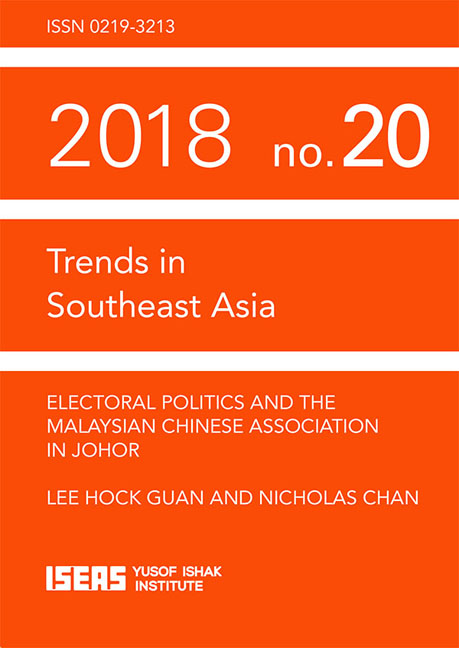Book contents
Electoral Politics and the Malaysian Chinese Association in Johor
Published online by Cambridge University Press: 12 March 2019
Summary
Introduction
Until the shocking results in the 14th General Elections (GE-14) in 2018 that saw the long-ruling Barisan Nasional (BN) being defeated by the opposition coalition, Pakatan Harapan (PH) in parliament and in most states, Johor was always regarded as BN's electoral bastion. Johor has the highest number of parliamentary seats contested and historically won by the two largest BN parties, the ethnic Malay-Muslim-based United Malays National Organization (UMNO) and its Chinese partner, the Malaysian Chinese Association (MCA). With a mixed racial make-up (60 per cent Bumiputera, 33 per cent Chinese, and 7 per cent Indian), clear urban–rural divides, an influential royal house, and a growing and relatively industrialized economy (Hutchinson 2018, p. 2; van Grunsven and Hutchinson 2016), Johor is often deemed to be the bell-wether of BN's support, or rather, its “jewel in the political crown”.
UMNO's strength in and dependence on Johor as its point of origin, a forging ground for leaders, and base of support has been convincingly documented (Hutchinson 2015b; 2018; Funston 1980). Yet, the same cannot be said for the MCA. The party's relative resilience in Johor, albeit amidst a notable decline from 2008 to 2018, remains unexplored. Its resilience can be seen from the fact that Johor MCA managed to hold onto most of its seats in the 2008 elections despite BN as a whole suffering massive losses nationwide. The importance of Johor can also be intimated from the fact that most MCA presidents are in some way connected to Johor — some for the fact that they are Johor-born (Neo Yee Pan, Chua Soi Lek); some for standing for office in the state (Lee San Choon and Ling Liong Sik); and almost all, with the exception of Tan Siew Sin, Tan Koon Swan, and Liow Tiong Lai, for having at some point of time been appointed Chairman of the MCA Johor State Liaison Committee.
This paper examines the MCA's electoral performance in Johor in relation to its history, Malaysia's national politics in general, the state's changing socioeconomic landscape, and most importantly, the unique ethnic-pooling formula that ultimately worked in the MCA's favour.
- Type
- Chapter
- Information
- Publisher: ISEAS–Yusof Ishak InstitutePrint publication year: 2018



